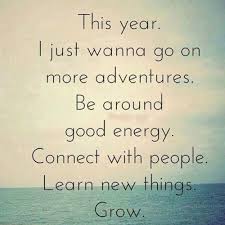David’s take on new years resolutions focussing especially on areas of personal resilience and wellbeing, and career plans for 2018
Overview
 We arrive into January, the start of another year, and the opportunity for me to fulfil one of my new year’s work resolutions: to start a Newsletter on interesting topics around Coaching and Resilience and send out at periodic intervals during the year. I am aware though that new year’s resolutions are hard to keep; if I’m honest this has been a “work resolution” for at least a couple of years and haven’t got around to doing it with level of busyness! I’m in good company though: a recent poll of 2,000 British people, published by BUPA, found that of those who said they would be setting a New Year’s resolution for the following year, half were not confident they would stick to it. In a recent Psychology at work article researchers looked at success rates of peoples’ resolutions: the first two weeks usually go along beautifully, but by February people are backsliding. And by the following December most people are back where they started—often even further behind. Among the top resolutions are weight loss, exercise, stopping smoking, better money management and debt reduction (I couldn’t find one about Newsletters….)
We arrive into January, the start of another year, and the opportunity for me to fulfil one of my new year’s work resolutions: to start a Newsletter on interesting topics around Coaching and Resilience and send out at periodic intervals during the year. I am aware though that new year’s resolutions are hard to keep; if I’m honest this has been a “work resolution” for at least a couple of years and haven’t got around to doing it with level of busyness! I’m in good company though: a recent poll of 2,000 British people, published by BUPA, found that of those who said they would be setting a New Year’s resolution for the following year, half were not confident they would stick to it. In a recent Psychology at work article researchers looked at success rates of peoples’ resolutions: the first two weeks usually go along beautifully, but by February people are backsliding. And by the following December most people are back where they started—often even further behind. Among the top resolutions are weight loss, exercise, stopping smoking, better money management and debt reduction (I couldn’t find one about Newsletters….)
Why is this the case? Making resolutions work involves changing behaviours, and in order to change a behaviour, you have to change your thinking (or “rewire” your brain). Brain scientists have discovered, through the use of MRI scans, that habitual behaviour is created by thinking patterns that create neural pathways and memories, which become the default basis for your behaviour when you’re faced with a choice or decision. Change requires creating new neural pathways from new thinking. There is a wonderful piece: Neuroplasticity; changing our belief about change article that illustrates this idea that “neurons that fire together, wire together” well.
So, I got to thinking what if we took a more holistic overview for the new year in a couple of areas that are typically important in our lives; our personal resilience and well-being and our careers?
Personal Resilience and well-being
 I am noticing resilience and well-being offerings springing up in all sorts of contexts at the moment. Perhaps because of these times of unprecedented turbulence, individuals are being stretched like never before. Many of the teams and individuals I work with are doing more with less people, facing huge reductions in budgets amidst constant changes happening within the organisation and across the public and private sectors.
I am noticing resilience and well-being offerings springing up in all sorts of contexts at the moment. Perhaps because of these times of unprecedented turbulence, individuals are being stretched like never before. Many of the teams and individuals I work with are doing more with less people, facing huge reductions in budgets amidst constant changes happening within the organisation and across the public and private sectors.
Resilience is the ability to recover quickly from setbacks and adversity. Resilient people stay committed and increase their efforts when the going gets tough, and have a well-developed “bounce back facility” (the word comes from the Latin root ‘resili’ meaning to spring back). This coping may result in the individual “bouncing back” to a previous state of normal functioning, or using the experience of exposure to adversity to produce a “steeling effect” and function better than expected (much like an inoculation gives us the capacity to cope well with future exposure to disease).
 More recently, there has also been evidence that resilience can indicate a capacity to resist a sharp decline in functioning even though a person temporarily appears to get worse. Resilience has been shown to be more than just the capacity of individuals to cope well under adversity. Resilience is better understood as both the capacity of individuals to navigate their way to the resources that sustain their well-being, and their capacity individually and collectively to negotiate for these resources to be provided. My own metaphor for holding resilience is that of a reservoir; the bottom of the reservoir is the “plug” which is open to give out and do the work I do in supporting others as a Coach and Facilitator. The top is the “tap” where I need to practice self-care to maintain a level of fill for the reservoir.
More recently, there has also been evidence that resilience can indicate a capacity to resist a sharp decline in functioning even though a person temporarily appears to get worse. Resilience has been shown to be more than just the capacity of individuals to cope well under adversity. Resilience is better understood as both the capacity of individuals to navigate their way to the resources that sustain their well-being, and their capacity individually and collectively to negotiate for these resources to be provided. My own metaphor for holding resilience is that of a reservoir; the bottom of the reservoir is the “plug” which is open to give out and do the work I do in supporting others as a Coach and Facilitator. The top is the “tap” where I need to practice self-care to maintain a level of fill for the reservoir.
The article I have written on personal resilience goes into this whole area in a lot more detail, and looks at possible ways of supporting our own resilience, as well as the areas of mindfulness and self compassion which underpin our ability to stay resilient.
It may be valuable to think about:
• What your own level of resilience is: e.g. there is a good free questionnaire developed by Kristin Neff that helps you review and score this
• What approaches to self-care do you take; how well do they work?
• Consider completing the Resilience coaching exercise: Resilience – self assessment exercise
Career direction
 I have worked with several clients going through career change in the last couple of years. Some come wanting to work on CVs or practical interview practice: for others it’s more of a step back from what they are doing and take stock approach. The work is often about “what do I really want” and/or confidence building when they have been in a role for a long time and having to start job searching because of changes in their current role.
I have worked with several clients going through career change in the last couple of years. Some come wanting to work on CVs or practical interview practice: for others it’s more of a step back from what they are doing and take stock approach. The work is often about “what do I really want” and/or confidence building when they have been in a role for a long time and having to start job searching because of changes in their current role.
A recent “State of the career” Report by Blessing White found that most employees understand that they, not their employers, need to control their careers. 57% of respondents overall don’t expect their employer to provide a clear career path, and that sentiment increases with age. Opportunities with current employers aren’t promising, as only one in two respondents believe they have decent career opportunities with their current employer. In the report, over a third expect their next career move will take them elsewhere. Most employees want work that works for them. As in previous studies, interesting work, meaningful work, and work/life balance were identified as the most important criteria for future jobs.
 For me, thinking about 2018, this coming year will be about some elements of consolidation and some elements of change; the things I want to move more towards are more 1-1 Coaching work, Team Coaching, working with teams on Resilience programmes and building in house Coaching programmes for organisations. The things I want to move away from are; direct training in areas like Leadership and Supervision skills, and one off Away Days, where a weight of expectation is put on making changes to Teams with a single day intervention.
For me, thinking about 2018, this coming year will be about some elements of consolidation and some elements of change; the things I want to move more towards are more 1-1 Coaching work, Team Coaching, working with teams on Resilience programmes and building in house Coaching programmes for organisations. The things I want to move away from are; direct training in areas like Leadership and Supervision skills, and one off Away Days, where a weight of expectation is put on making changes to Teams with a single day intervention.
Things to consider in terms of what your 2018 will look like are:
• What does your year look like in relation to your career development; consolidation, pastures new, learning new skills for example?
• What are the things you want to move towards and the things you want to move away from?
• Different career assessment tools can help individuals gain a better understanding of themselves, expand career options, find a good match with employers, and identify strengths for the ever-shifting workplace. Here are a few that I have found useful working with clients including looking at your career drivers, your ideal job description and a skills/interest model.
Overall reflections
 So, approaching this new year, what might it look like for you? There are planning tools that can help unlock ideas like the Futures tool. The idea of the Futures map is to create the opportunity to do a brain dump to help structure that confusion in our minds about all the different elements around making such a big change decision. The map has 4 areas; work, home/location, partner/family/friend’s considerations, and a personal/growth section. The idea is to go through each of these and think through what the implications of change might mean.
So, approaching this new year, what might it look like for you? There are planning tools that can help unlock ideas like the Futures tool. The idea of the Futures map is to create the opportunity to do a brain dump to help structure that confusion in our minds about all the different elements around making such a big change decision. The map has 4 areas; work, home/location, partner/family/friend’s considerations, and a personal/growth section. The idea is to go through each of these and think through what the implications of change might mean.
Another approach is the The PATH Tool that encourages you to focus on all the things that you would love to do in life, things you would like to achieve and what the initial steps of the journey look like. The most critical part of this is deciding on the initial steps and getting started. We may plan the entire journey, but one thing is guaranteed – it won’t turn out exactly how we imagined it
It’s also worth thinking about who or what will help you make the changes. If we are changing something that has some history, we will probably need to enrol other people into helping us. This requires some vulnerability and the ability to ask for help. However, when an issue that we are working on is out in the open, it tends to feel lighter and has less power than when it is tucked away in our heads only; from a coaching perspective it also increases the chance of us actually making it happen. This might include sharing with a small number of trusted people your goal and plan, why it matters to you and that you recognise you need help.
Whichever routes you choose for this coming year, I wish you well in realising your wishes and ambitions this coming year.